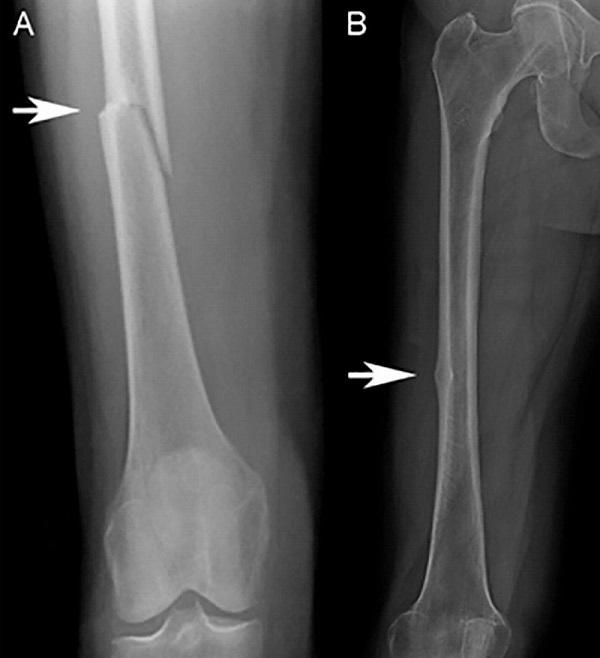March 8, 2021
Kinesiology researcher studies rare fractures in post-menopausal women

More than 80 per cent of all bone fractures occur in people over 50 years old, most of whom have osteoporosis, according to Osteoporosis Canada. Researchers in the Faculty of Kinesiology and the McCaig Institute for Bone and Joint Health are examining a very rare type of fracture for those with osteoporosis, known as an atypical femoral fracture.
“For some time, we were focusing on stress fractures in athletes, and it turns out there is another population of people who experience these ‘fatigue-like’ fractures, those who have osteoporosis,” says Dr. Brent Edwards, PhD, an associate professor in kinesiology.
Edwards and his team, including orthopedic surgeon Dr. Prism Schneider, MD, PhD, of the Cumming School of Medicine, are studying the cause of these fatigue fractures, known as atypical femoral fractures that occur in the thighbone, to help prevent this injury.
The most common osteoporotic fractures occur because of a low energy event, like a fall from standing height, where the applied load exceeds the strength of the bone. A fatigue fracture is different. These fractures don’t occur because of a single event, but happen because of overuse, similar to a repetitive strain injury that creates a stress fracture in athletes.

Brent Edwards.
Riley Brandt, University of Calgary
Treatment to help ward off broken bones
Bisphosphonates are the frontline drug therapy that helps maintain bone mineral density and bone strength to help prevent osteoporotic fracture. Without this medicine, there would be many more fractures in individuals with osteoporosis. Bisphosphonates are known to reduce the risk of fracture by up to 50 per cent.
Atypical femoral fractures are most frequently observed in post-menopausal females with osteoporosis that have taken bisphosphonates for more than five years. This is why it is important to ensure that when taking these medications, individuals must continue to follow up with their doctor.
“Unfortunately, less people are taking this medication, and it’s causing a rise in osteoporotic fractures,” says Edwards. He emphasizes that atypical femoral fractures are very uncommon and people with osteoporosis are much more likely to have an osteoporotic broken bone. For every atypical femoral fracture, more than 1,000 osteoporotic fractures are prevented, including more than 100 hip fractures, according to a paper in endocrine reviews.
Individuals may ward off an atypical femoral fracture if they experience thigh pain and have an X-ray. What they will see is the “dreaded black line” that looks like a crack, or sometimes they will see a bump — a callus that builds around the injured bone trying to repair and prevent the crack from growing. (See the X-ray image of the femoral shaft).

Left “A” is an atypical femoral fracture, and on the right “B” illustrates the bone’s response, which happens before the atypical femoral fracture.
Aliya Aziz Khan, Stephanie Kaiser CMAJ Apr 2017, 189 (14) E542; DOI: 10.1503/cmaj.160450
Edwards’ team studies how repetitive stress causes damage within biological tissues including bone, a process known as mechanical fatigue. They perform basic experiments on tissues to enhance our understanding of how osteoporotic drugs affect the mechanical fatigue process, and applied experiments in humans for the development of treatments and interventions to improve tissue quality and decrease injury risk.
“With this research we hope to define the mechanism of atypical femoral fracture, so that we can create safe and effective therapeutic strategies to prevent these injuries, and develop advanced medical imaging approaches to identify individuals that may be at a higher risk of fracture,” says Edwards.
Brent Edwards is an associate professor in the Faculty of Kinesiology, an associate director of the biomedical engineering graduate program and member of the Cumming School of Medicine’s McCaig Institute for Bone and Joint Health.
Prism Schneider is an orthopaedic trauma surgeon, an associate professor in the departments of Community Health Sciences and Surgery and member of the McCaig Institute for Bone and Joint Health and the O’Brien Institute for Public Health at the Cumming School of Medicine.
The Faculty of Kinesiology is No. 1 ranked sport science school in North America and No. 11 globally, according to the ShanghaiRanking.
The University of Calgary’s multidisciplinary Engineering Solutions for Health: Biomedical Engineering research strategy drives solutions to our most pressing health challenges in disease and injury prevention, diagnosis, and treatments. Our biomedical engineering researchers make a significant impact in our communities by extending lives, improving quality of life, promoting independence, and continuously improving the health system.





